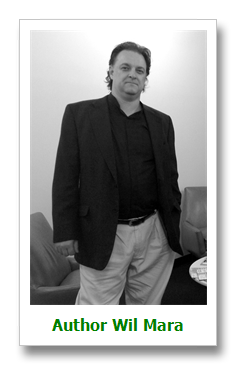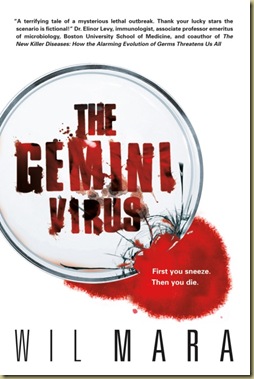It starts with a sneeze. It kills in four days. There is no cure.
 If that doesn’t caught your attention, I don’t know what will. It’s the beginning of cold and flu season in most of the nation, so it’s the perfect time to read the chilling new disaster novel by Wil Mara, THE GEMINI VIRUS.
If that doesn’t caught your attention, I don’t know what will. It’s the beginning of cold and flu season in most of the nation, so it’s the perfect time to read the chilling new disaster novel by Wil Mara, THE GEMINI VIRUS.Wil is touring blogdom with his release of this engaging thriller and stops by today to graciously answer some questions about this writing. Thanks to Wil and the lovely Aisha at Tor and Forge Books, I have 2 hardcover copies of THE GEMINI VIRUS to giveaway. Please see the end of the post for guidelines.
This engaging thriller follows a mysterious, wildly contagious virus that kills within four days and seems to have no cure. As the disease moves from a small community to globally, panic and chaos spreads as a pair of charismatic CDC researchers and their team search frantically for the cause of and cure before it’s too late.
Here’s a brief synopsis of THE GEMINI VIRUS:
Bob Easton thinks he has a cold. Before he dies in agony, four days later, he infects dozens of people. Local health agencies become quickly overwhelmed by the sick and dying and beg the CDC for help. Dr. Michael Beck and Cara Porter, a member of the Epidemic Intelligence Service, race to identify the deadly bug. They can't cure it until they know what it is.
Dennis and Andi Jensen and their children are terrified. Schools and offices close. Fresh food disappears from store shelves. Three of their children's friends die. Their neighbors are dying or running away, fleeing the unstoppable infection. Desperate, the Jensens join the exodus, making a nightmarish journey to their isolated mountain cabin along empty roads, through abandoned towns, past looted shopping malls.
The superbug—and the panic—quickly spreads beyond America’s borders. On a packed plane, someone coughs—and at their destination, the pilots are told, “you can’t land here.” US military bases are quarantined. Yet the virus continues to spread. Some believe the plague is man-made. Others see it as a sign of the end times. In the lab, Cara Porter makes a potentially fatal mistake. In the mountains, Andi Jensen tells her husband that she doesn’t feel well.
The world is running out of time.
Now let’s find out what Wil has to say.
Mason - What is an average writing day like for you? Do you write longhand and on the computer, have a favorite place to write, a favorite time to write, listen to music or have to have quiet?
Wil - I like to write first thing in the morning, immediately after I get up. I find that sharp morning energy conducive to good creativity. I usually wake around 5:00 and get in about two and a
 half hours of solid work. Then I make breakfast for my daughters and get them off to school. (On weekends, I’ll simply take a break at this time.) A second writing session goes from 9:00 to noon, followed by a half hour for lunch. A third goes from 12:30 to 3:00. After that the girls are back from school, and I’m usually finished writing for the day. If necessary, I can do a fourth stretch in the evening, from 7:00 to 9:00. My goal is to produce five solid, publishable pages every day.
half hours of solid work. Then I make breakfast for my daughters and get them off to school. (On weekends, I’ll simply take a break at this time.) A second writing session goes from 9:00 to noon, followed by a half hour for lunch. A third goes from 12:30 to 3:00. After that the girls are back from school, and I’m usually finished writing for the day. If necessary, I can do a fourth stretch in the evening, from 7:00 to 9:00. My goal is to produce five solid, publishable pages every day. As for writing longhand, no, I haven’t done that since the very earliest days of my career, back in the late ‘80s. Just about everything is done on computer. I find it much easier to keep up with my thoughts if I’m typing. When I travel, I always have either my laptop or my netbook with me.
Per favorite places, I have a fully finished office in my basement, and that’s where the bulk of the work gets done. I don’t put music on, as I prefer it as quiet as possible. I just find it easier to ‘climb into’ the story and get into The Zone when there are no distractions.
Mason - Where did the inspiration for this book come from?
Wil - I’ve always loved thrillers, and I’ve always loved the ‘super virus’ subgenre. That said, I wanted to do my own ‘virus novel’ for a long time. I’d been formulating a story for years, pulling in bits and pieces from the air, until I felt I had something complete. When my editor asked what was next after Wave, I presented the idea for The Gemini Virus, she liked it, and we moved forward.
As for the characters—the epidemiological team came from my desire to have characters located at the heart of the crisis (i.e., directly responsible for dealing with it), the family of four came from the need for the story to have characters that most readers could connect with (and to give perspective of how the pandemic would play in an ordinary community), and the governmental and terrorist characters came from the desire to give the story a global dimension.
Mason - How did you go about doing research for this book? Was it a process you enjoyed or just found it necessary?
Wil - I loved the research process for this book. I’m a naturally curious person who always wants to learn new things, so that was one factor. The other was that I found a wonderful person named Dr. Marty Hewlett (studied at MIT and Harvard, worked with a Nobel Laureate, now a professor at UNM) who helped with the technical details. Marty is one of the finest people I’ve ever known and made the whole process a real joy. We have become very good friends since the research of Gemini, and I hope to find a way to work with him again.
Mason - What message, if any, would you like readers to take away from this book?
Wil - That although the story is fiction, there is nothing in it that can’t actually happen. The science is completely credible and the scenario is well within the realm of the possible. A super pandemic will visit this world sooner or later—absolutely guaranteed—so be on the lookout. Better that we game it out in this book and be prepared, right?
Mason - What would you say is the worst thing about writing and what is the best?
Wil - I don’t find anything particularly distasteful about the writing process; I love every aspect of it. If I had to come up with something, maybe the enforced isolation, as this is a very lonely profession. As for the best, hmm…. As I said, I enjoy just about all of it. Perhaps the satisfaction that goes with getting positive feedback from readers and knowing you’ve succeeded in your objective of both educating and entertaining them. It’s wonderful to have asked for their attention for a little while and see that they were happy to have given it.
Mason - What can readers look forward to next from you?
Wil - The next book in the disaster-thriller series is called Fallout. I’m writing it right now, and it’s going to take a very modern and very fresh look at one of the most controversial forms of renewable energy.
Wil, thanks for joining us today and answering these questions. It’s fun to read disaster thrillers like yours, but at the same time it’s a bit terrifying to stop and think these events could really happen.
A little background on Wil. He is a steadily working professional writer with more than one hundred books to his credit, primarily in the school and library market. His previous disaster novel, WAVE, published by a regional press, won the New Jersey Notable Book Award. THE GEMINI VIRUS is the second book in the disaster series, with several more stories currently in development.
For more information on Wil and his writing, visit his website at www.wilmara.com.
Now the giveaway guidelines. To enter, send me an e-mail (mcbookshelf@gmail.com) with the subject line, “Win THE GEMINI VIRUS.” Your message should include your name and mailing address. The contest is open to residents of the U.S. and Canada only. And, just so you know, I don’t share this information with anyone other than the publisher nor use it for any other purpose. The deadline to enter this giveaway for a chance at one of 2 copies of THE GEMINI VIRUS, a 352-page hardcover, will be 8 p.m. (EST) on Saturday, Nov. 3.
Here’s what Publishers Weekly had to say about THE GEMINI VIRUS:
“A subplot involving terrorism helps build suspense, but the virus itself and the deadly possibility that it could appear in the real world is quite enough to keep you turning pages to see who will live, who will die, and how the invader will be vanquished.”
Do you enjoy disaster thrillers? Do you not read them because they make you think ‘it could happen’ too much? Thanks so much for stopping by.








Wil, thanks again for stopping by and answering these questions. The thought of a virus such as this is very scary. Wishing you much success and looking forward to seeing what FALLOUT is all about.
ReplyDeleteMason - Thanks for hosting Wil.
ReplyDeleteWil - I know what you mean about being naturally curious. I'm that way too. I think a lot of authors are like that. And doing good research simply makes a book better. I wish you much success with The Gemini Virus.
I love a good thriller. The race against time to accomplish or thwart something is a great read. The threat, what ever it is, is truly the main character but I love the characters added to up the ante because you care about them.
ReplyDeleteThis sounds like a good one!
Nice interview Mason and Wil.
This book sounds awesome. Great interview, guys.
ReplyDelete